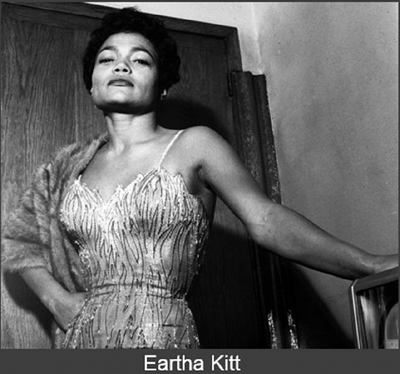
The recent news of the president’s encouragement of Israeli Prime Minister Benjamin Netanyahu’s decision to block Representative Ilhan Omar and Representative Rashida Tlaib from visiting the Israeli occupied West Bank and Jerusalem reminds us of our country’s long history of “whitelisting” people who speak out about their political beliefs. The news mirrors what happened over fifty years ago, when actress Eartha Kitt was forced to leave the country in order to find work after voicing her opposition to the Vietnam War. She says, “No, I wasn’t blacklisted. I was whitelisted.”
In 1968, Eartha Kitt was invited to the White House for a luncheon with President Lyndon B. Johnson and First Lady Bird Johnson, and the following question was asked: “Why is there so much juvenile delinquency in the streets of America?” Kitt responded, “The first thing that people would do is burn those trees down to make fire because what they want are jobs.” She continued, “You send the best of this country off to be shot and maimed. They rebel in the street. They will take pot and they will get high. They don’t want to go to school because they’re going to be snatched off from their mothers to be shot in Vietnam.” Kitt went on, pointing at the audience, “They can’t get to you and they can’t get to the president, and so they rebel in the streets.” Mrs. Johnson’s eyes filled with tears with Kitt’s response. Following the luncheon, President Johnson ordered the CIA to investigate Kitt’s background. The CIA characterized Kitt as a “sadistic nymphomaniac.” In the decade following, Kitt, unable to find a job in the United States, was forced to perform in Europe until she returned home in 1978.
The rise of “whitelisting” began in the late 1940s and 1950s, the McCarthy era, in which political activists were routinely persecuted for alleged ties to the Communist Party. In 1950, accused of being a Communist, actor and singer Paul Robeson had his passport revoked by the State Department, preventing his travel outside the country. Robeson filed a lawsuit against the State Department and a long legal battle ensued because he refused to sign an affidavit declaring that he was not a Communist. He told the House Un-American Activities Committee in 1956, “Whether I am or not a Communist is irrelevant. The question is whether American citizens, regardless of their political beliefs or sympathies, may enjoy their constitutional rights.” Singer William Warfield remembers Paul Robeson during the McCarthy era, “Paul Robeson was special because of the vision that he had of brotherhood and mankind. And they took all of that and reversed it around and made brotherhood sound like a dirty word. Because that’s what the Russians were calling it. He was for the people.”
In 1951, at the age of eighty-three, W.E.B Du Bois was indicted, arrested, and arraigned in federal court as an agent of the Soviet Union because he had circulated a petition protesting nuclear weapons. The Justice Department saw the petition as communist propaganda and accused Du Bois of being “un-American.” Du Bois was acquitted due to lack of evidence. The State Department illegally revoked his passport, preventing him from traveling to Canada to attend a peace conference in 1952. The Supreme Court restored passport rights for suspected communists in 1958, and three years later Du Bois moved to Ghana. While he was there, however, the State Department refused to renew his passport, effectively annulling his U.S. citizenship. Du Bois’ “whitelisting” had implications beyond restricting his ability to travel. Journalism professor and newspaper correspondent Francis Ward remembers, “The name of Du Bois was hardly ever mentioned in any of my classes or any conversations that people would have and I am sure that the reason was because during the 1950s, there was this fear that if you ran afoul of the red baiters or the communist hunters at that time, the House Un-American Activities Committee, the Joe McCarthy committee, that somehow you would get into some kind of trouble. So, I didn’t learn anything about Du Bois until after I finished Morehouse.”
Eartha Kitt, Paul Robeson, W.E.B. Du Bois, and Congresswomen Omar and Tlaib are some of those who spoke out against racism, violence, and imperialism at home and abroad. “Whitelisting” was a threat then and is a threat now.


Be the first to comment